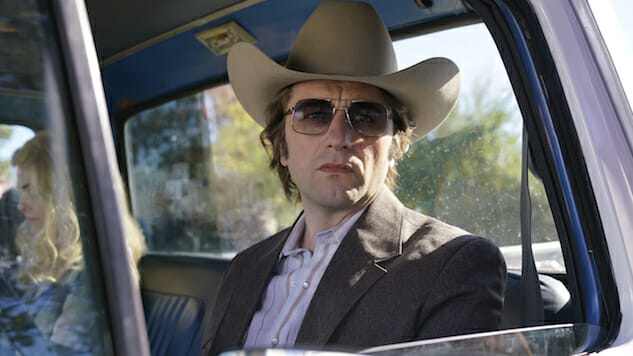The cue’s so cunning I smiled to myself, despite the dreadful act: As Philip and Elizabeth (Matthew Rhys and Keri Russell) clean the crime scene they’ve created on their Oklahoma jaunt, polishing the place where the researcher’s head met the glass and carrying away his corpse, Roxy Music’s “More Than This” rises on the soundtrack. It’s another moment, as I wrote of “Pests,” in which expectation and execution part, but if the song’s pop complexion seems strange so soon after the snap of the lab tech’s neck, its refrain suggests the desolate axis around which “The Midges” turns. Recalling Mad Men’s pungent use of Peggy Lee’s “Is That All There Is?” The Americans supplies an answer, working through the unutterable notion that this long, cold war is without purpose. “More than this, there is nothing,” the lyrics insist, and with its first-rate final sequence, the episode edges the series ever closer to assent.
“Compared to this, Matthew Beeman won’t seem so important,” as Philip says in the opening stages, convinced that telling Paige (Holly Taylor) about the crop operation will finally break the spell. “This,” of course, is the threat the pests pose to Soviet foodstuffs, and thus to the populace; urged on by memories of desperate hunger, he and Elizabeth see their mission as a humanitarian initiative, protecting their people from famine. After returning home from bowling with Tuan (Ivan Mok) and the Morozovs—an evening that underscores the personal nature of political persuasion, what with Alexei (Alexander Sokovikov) describing his father’s imprisonment in a Siberian gulag, and Tuan ruing the American destruction of Vietnam—Philip and Elizabeth launch their conversation with Paige on a hopeful, even breezy note, similarly assured of the righteousness of their cause.
It’s a terrific sequence, marshaling The Americans’ delicate aesthetic to construct a telling family tableau: Philip and Elizabeth, partners in life and work, move in tandem from the couch to the kitchen, picking up plates and depositing them in the sink; Paige, framed separately, poses her questions at a slight remove, still wary of her parents’ penchant for deception. By the time the exchange reaches its end, though, Paige has joined Philip and Elizabeth at the island, nearer the answers she seeks both literally and figuratively. “Is it hard, pretending to be other people?” she asks. “Yeah,” Philip says, finishing the exchange on a frank and trusting note. “Sometimes it’s really hard.”
In retrospect, his answer foreshadows the future as much as it reflects the past, for the Moscow-set scene that follows—after a brief, grim flashback to Philip’s childhood—returns us to the consequences of his most difficult and damning performance. The sight of Martha (Alison Wright) weighing cans and jars between the store’s sparse shelves is a devilishly satisfying surprise: I audibly gasped as the identity of the woman in the scarf suddenly explained the camera’s lingering pause in the aisle. It might be fan service—if “The Midges” has a flaw, almost imperceptible, it’s the faint sense that Martha’s presence, like Philip’s emphatic last line, has been shoehorned into subtler proceedings—but even if Wright’s “special appearance by” credit suggests a one-off, at least for now, the patience with which The Americans approaches even its mightiest revelations pays off in spades. Coming, as it does, at the conclusion of Oleg’s (Costa Ronin) frustrating meeting with the market’s manager, the moment “The Midges” doesn’t cut to black is scintillating indeed. With their lofty ideals, Philip and Elizabeth define the lives they’ve destroyed as an acceptable sacrifice, but there is no principle, no rationalization, that can erase the costs of conflict from their moral ledger.
In this they’re no better than Alexei himself (“You’re the one who destroys,” his wife hisses), no more successful than Tuan in separating espionage from emotion, and as the episode examines the aim of their labors, it becomes increasingly difficult for Philip and Elizabeth to hold their compromises at arm’s length. The second half of “The Midges” is almost inexorable, demanding “more than this” as the “nothing” of the song presses in from the margins: Gabriel (Frank Langella) cautions against rash action, the details of the Americans’ plans for the pests as yet unknown; Philip, in that forlorn, lushly romantic interlude in the couple’s Oklahoma hotel room, leans into his doubts before Elizabeth pulls him back. It’s a measure of the hour’s supreme confidence that their tender swaying to Alabama’s “Old Flame,” cast as a kind of homesickness, is one of four or five moments in “The Midges” on which a lesser series might rest an entire season: The Americans roils with intense feeling, but its pleasures are not volcanic in nature—its secrets and sentiments seep into the tiniest gestures, the most quotidian moments, until we realize the trickle’s a flood.
It falls to Paige to point out the distinction between the self and the alias, to describe the ceaseless gnawing of the secret kept or the sentiment feigned, and as such it’s her conversation with Elizabeth that tees up Philip’s closing question: “Should we tell Paige about this?” is rhetorical, even darkly funny, but the fact that there are aspects of their lives that must remain hidden belies Elizabeth’s earlier resolve. While Paige wants her lies, and her parents’, to have purpose—she bristles when Matthew (Danny Flaherty) shrugs at the state of the world—she is also keenly aware that the ease of “being fake,” of crushing the truth between her thumb and her forefinger, is exactly why it feels “gross.” Her mother’s response is firm, though it also betrays much the same fear as the aforementioned sequence and the accompanying song—that this is all there is, and that none of us, regardless of politics or personal history, ever manage to escape it.
“You hold back what you need to,” Elizabeth says. “Everybody does.”
Matt Brennan is the TV editor of Paste Magazine
. He tweets about what he’s watching @thefilmgoer.